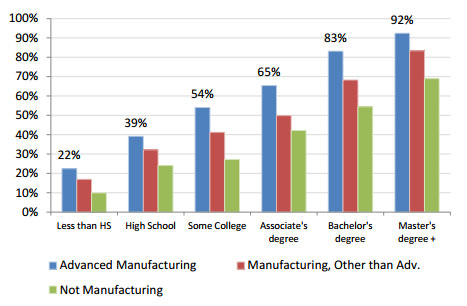From 2012 to 2015, the Department of Higher Education developed industry-specific workforce plans to support and coordinate economic and workforce development initiatives across Massachusetts' 29 public college and university campuses and align training, certificate, and degree programs with the workforce needs of the Commonwealth's growth and emerging industry sectors.
The ![]() Technology Talent Initiative Workforce Plan is the first comprehensive statewide assessment of the technology sector’s workforce requirements, offering a detailed analysis of the scope and scale of the technology talent gap and the role of the public higher education system in addressing shortages.
Technology Talent Initiative Workforce Plan is the first comprehensive statewide assessment of the technology sector’s workforce requirements, offering a detailed analysis of the scope and scale of the technology talent gap and the role of the public higher education system in addressing shortages.
The report cites an analysis of online job postings showing that 15% of Massachusetts jobs requiring a college degree are in technology related professions. In contrast, only 4% of degrees and certificates granted are in computer science and IT fields. The report also includes data showing that the number of jobs in science, technology, engineering and math (STEM) fields is projected to grow by 23% overall through 2020, and that the largest share of those jobs will be in technology fields, outnumbering new jobs in architecture, engineering, life sciences and physical sciences combined.
To address the shortages of qualified workers, the plan calls for a review of program capacity in state college and university computer science and IT programs. Working groups will be convened in the summer and fall of 2014 to address specific issues such as the need to increase internship opportunities and provide smoother transfer pathways from community colleges to state university and UMass campuses.
The ![]() Advanced Manufacturing Workforce Plan addresses the sector’s need for a more highly skilled and educated workforce and public higher education’s role in preparing this workforce.
Advanced Manufacturing Workforce Plan addresses the sector’s need for a more highly skilled and educated workforce and public higher education’s role in preparing this workforce.
The data presented in this report suggest that there is currently a sizable workforce supply/demand gap (demand exceeds supply 2:1, conservatively), and that the emerging requirements for the next generation workforce must be addressed by higher education in advance of employer demand to ensure Massachusetts future competitiveness in this important sector.
The term advanced manufacturing is used to broadly describe a major segment of Massachusetts’ economy that encompasses an array of industry specific sub-sectors. These include: Computer and Electronic Products , Fabricated Metal Products and Machinery, Chemical and Plastics (incl. Pharmaceuticals), Medical Equipment and Supplies, Food Processing and Production, and Paper and Printing.
Percent of Massachusetts Workers Earning at least 45K Annually by Industry

Advanced manufacturing jobs provide rewarding opportunities for new as well as established workers who seek family sustainable careers that have middle-skill education entry points and provide opportunities to progress in these careers through attainment of postsecondary certificates and degrees.